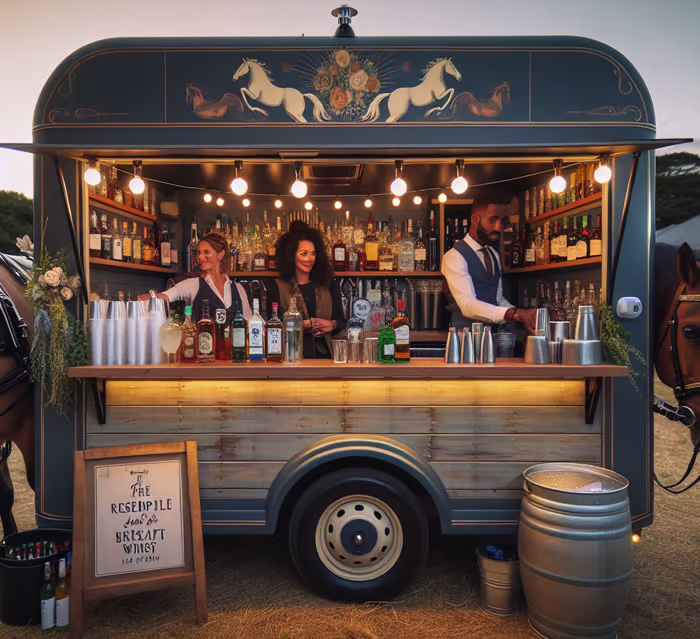Do You Need a Liquor License for a Mobile Bar in California?
Do you need a liquor license for a mobile bar in California? The answer isn’t straightforward. California operates under unique regulations that distinguish between different types of mobile bartending operations, making licensing requirements more complex than many entrepreneurs expect.
Do You Need a Liquor License to Be a Mobile Bartender in California?
The fundamental question of whether you need a liquor license for mobile bartending depends entirely on your business model. California operates as a dry hire state, meaning you can’t sell alcohol unless you have a brick-and-mortar location with a liquor license. This creates distinct pathways for mobile bartending businesses.
Mobile bartenders who only provide service without selling alcohol typically don’t need a liquor license. However, they must obtain RBS certification through the California Department of Alcoholic Beverage Control. This certification became mandatory on July 1, 2022, under Assembly Bill 1221.
The circumstances under which a license is required to be obtained from ABC are very broad, and encompass all situations in which alcoholic beverages are sold. This includes scenarios where customers pay for drinks, even indirectly through event fees or package pricing.
Mobile Bar Liquor License: Understanding California’s Dry Hire Model
California’s dry hire model fundamentally shapes mobile bartending operations. Every mobile bar in California operates as a dry hire, requiring clients to purchase the alcohol for private events. This restriction stems from Alcohol Beverage Control regulations that tie liquor licenses to fixed locations.
Dry hire businesses provide bartenders, equipment, ice, and mixers while clients supply all alcoholic beverages. This model eliminates the need for a traditional liquor license but doesn’t remove all regulatory requirements. Mobile bartending services must still comply with business licensing, health permits, and certification requirements.
The dry hire approach offers significant advantages. You avoid lengthy liquor license applications, reduce startup costs, and eliminate inventory management challenges. However, success depends on clear client communication about alcohol procurement responsibilities.
RBS Certification: The Non-Negotiable Requirement
RBS or ABC certification is required for servers or bartenders, providing guidelines on responsible alcohol service. The California Department of Alcoholic Beverage Control mandates this training for anyone serving alcoholic beverages, including mobile bartenders.
Assembly Bill 1221 defines an alcohol server as anyone employed at an ABC on-premises licensed establishment who is responsible for checking identifications, taking customer orders, and pouring or delivering alcoholic beverages. Mobile bartenders fall under this definition when serving at events.
New employees who become bartenders, waiters, and managers must become RBS Certified within 60 days of hire. The certification process involves registering in the RBS Portal, completing approved training, and passing an ABC exam. RBS server certifications are valid for three years.
The training covers California laws, responsible sale and service of alcohol, carding and identification, standard drink sizes, and effects of alcohol. Training courses are offered in English, Chinese, Korean, Spanish, and Vietnamese to accommodate diverse workforce needs.
Special Event Permits: When Mobile Bars Need Licensed Partners
California’s special event permit system creates opportunities for mobile bartending expansion. However, these permits require partnerships with licensed establishments rather than independent mobile bar licensing.
Only a catering company with an existing ABC liquor license can apply for an ABC 218 permit for special events. Mobile bartenders can partner with licensed caterers to serve at events requiring alcohol sales. This arrangement provides full-service capabilities while maintaining compliance.
Special daily licenses (Type 221) allow temporary alcohol service for specific events. These permits must be obtained by licensed entities, creating partnership opportunities for mobile bartenders seeking expanded service offerings.
Business Licensing Requirements Beyond Liquor Permits
Mobile bartending license requirements extend far beyond alcohol-specific permits. Basic business licensing forms the foundation of legal operation in California.
A business license represents one of the first requirements for mobile bartending operations. California controls business licenses through city or county jurisdictions where you operate. Registration as an LLC protects personal assets and provides professional credibility.
California requires seller’s permits for sales tax collection, even for service-only businesses. The California Department of Tax and Fee Administration provides online services for permit applications. This permit becomes essential when clients pay service fees or gratuities.
Health department permits may apply depending on your service model. Some jurisdictions require mobile food facility permits when serving beverages, even without food service. Research local health department requirements in each operating jurisdiction.
Insurance and Liability Considerations
Mobile bartending insurance requirements reflect the unique risks of serving alcohol at various locations. California’s liability laws make proper insurance coverage essential for business protection.
General liability insurance protects against third-party bodily injury claims and property damage. Liquor liability insurance becomes crucial when serving alcohol, even under dry hire models. Some policies specifically exclude alcohol-related incidents without proper coverage.
Professional liability coverage protects against service-related claims and client disputes. Vehicle insurance must cover commercial use when transporting equipment to events. Business property insurance protects equipment during transport and storage.
Insurance requirements can vary by county, making consultation with local departments essential. Mobile bartenders should budget at least $100 monthly for comprehensive coverage meeting California requirements.
County-Specific Regulations and Compliance
Laws regarding mobile bars can vary between counties and cities in California, creating complex compliance landscapes for entrepreneurs. San Diego, Los Angeles, and San Francisco each maintain distinct requirements beyond state regulations.
Some jurisdictions require permits for each city where you operate outside your base location. Health department approval may be required for equipment and service methods. Zoning restrictions can limit where mobile bartending services can operate.
Contact local health departments and business licensing offices before operating in new jurisdictions. Some counties require additional certifications or permits for mobile beverage service. Research thoroughly prevents costly compliance issues and business disruptions.
## Maximizing Success in California’s Mobile Bartending Market
Understanding California’s regulatory framework enables strategic business development in mobile bartending. The dry hire model creates profitable opportunities for entrepreneurs willing to navigate compliance requirements properly.
Focus marketing on service excellence rather than alcohol provision. Highlight professional bartending skills, equipment quality, and event enhancement capabilities. Build relationships with event planners who understand dry hire models and value professional service.
Consider partnerships with licensed caterers for events requiring alcohol sales. These arrangements expand service capabilities while maintaining legal compliance. Develop standard operating procedures ensuring consistent service quality across all events.
California’s mobile bartending market rewards businesses combining regulatory compliance with exceptional service delivery. Proper licensing, certification, and insurance create foundations for sustainable growth in this dynamic industry.


